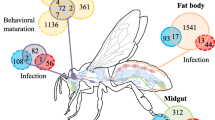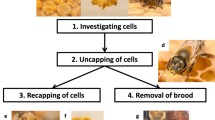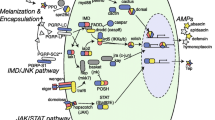Abstract
Aggression is a context-dependent behavior that often represents an adaptive trade-off with other energetically demanding phenotypes. Diseases can impose strong selection pressures on an organism, impacting the expression of aggression if the behavior is physiologically or genetically linked to disease resistance traits. However, aggression is also often a “sickness behavior” modulated directly by infection to conserve energy. Here we examine the cause-effect relationships between aggression and infection in the honey bee (Apis mellifera), a species with a heavy disease burden in which aggression has been correlated with diverse positive health outcomes. We induced infection in individual worker bees that differ in baseline aggression levels as a function of their colony-of-origin. We evaluated whether baseline aggression alters the response to infection, including the expression of disease-resistance behaviors and immune genes (defensin-1, hymenoptaecin, and vitellogenin). We found limited impact of baseline aggression on immune gene expression and the behavioral response to infection, but showed that infection can cause a change in aggression, at least in some cases. Though we cannot rule out the idea that high aggression is protective against infection, we find greater support for the idea that low aggression may be an energy-conserving “sickness behavior.” Future work concerning the evolutionary ecology of aggression and disease resistance in honey bees should consider the bidirectional relationship between these phenotypes, as well as the range of possible genetic and physiological mechanisms that connect them.
Significance statement
Genetic and physiological relationships between disease resistance traits and other behavioral phenotypes like aggression may impact how both traits are expressed in a particular ecological context, and ultimately, how these traits evolve. These relationships are particularly complex in social species, where social interactions both modulate aggressive behaviors and are involved in the response to infection. In honey bees, where pathogen loads and other stressors are prevalent, high aggression predicts health resilience. Here we show that high aggression co-occurs with some behavioral traits that improve the outcome of infection like grooming behaviors. Infection also causes a change in immune function and to an extent aggression, suggesting low aggression that is to some degree an energy conservation measure in sick honey bees.






Similar content being viewed by others
References
Adamo SA, Jensen M, Younger M (2001) Changes in lifetime immunocompetence in male and female Gryllus texensis (formerly G. integer): trade-offs between immunity and reproduction. Anim Behav 62:417–425. https://doi.org/10.1006/anbe.2001.1786
Alaux C, Robinson GE (2007) Alarm pheromone induces immediate-early gene expression and slow behavioral response in honey bees. J Chem Ecol 33:1346–1350. https://doi.org/10.1007/s10886-007-9301-6
Alaux C, Duong N, Schneider SS, Southey BR, Rodriguez-Zas S, Robinson GE (2009a) Modulatory communication signal performance is associated with a distinct neurogenomic state in honey bees. PLoS One 4:e6694. https://doi.org/10.1371/journal.pone.0006694
Alaux C et al (2009b) Honey bee aggression supports a link between gene regulation and behavioral evolution. Proc Natl Acad Sci U S A 106:15400–15405
Alaux C, Ducloz F, Crauser D, Le Conte Y (2010) Diet effects on honeybee immunocompetence. Biol Lett 6:562–565. https://doi.org/10.1098/rsbl.2009.0986
Amdam GV (2011) Social context, stress, and plasticity of aging. Aging Cell 10:18–27
Amdam GV, Aase SC, Seehuus M, Fondrk K, Norberg K, Hartfelder K (2005) Social reversal of immunosenescence in honey bee workers. Exp Gerontol 40:939–947
Ament SA, Corona M, Pollock HS, Robinson GE (2008) Insulin signaling is involved in the regulation of worker division of labor in honey bee colonies. Proc Natl Acad Sci 105:4226–4231
Barron AB (2015) Death of the bee hive: understanding the failure of an insect society. Curr Opin Insect Sci 10:45–50
Bates D, Mächler M, Bolker B, Walker S (2015) Fitting linear mixed-effects models using lme4. J Stat Softw 67:1–48
Bell AM (2005) Behavioural differences between individuals and two populations of stickleback (Gasterosteus aculeatus). J Evol Biol 18:464–473. https://doi.org/10.1111/j.1420-9101.2004.00817.x
Biesmans S, Meert TF, Bouwknecht JA, Acton PD, Davoodi N, de Haes P, Kuijlaars J, Langlois X, Matthews LJR, ver Donck L, Hellings N, Nuydens R (2013) Systemic immune activation leads to neuroinflammation and sickness behavior in mice. Mediat Inflamm 2013:271359. https://doi.org/10.1155/2013/271359
Bordier C, Suchail S, Pioz M, Devaud JM, Collet C, Charreton M, le Conte Y, Alaux C (2017) Stress response in honeybees is associated with changes in task-related physiology and energetic metabolism. J Insect Physiol 98:47–54. https://doi.org/10.1016/j.jinsphys.2016.11.013
Brandt A, Grikscheit K, Siede R, Grosse R, Meixner MD, Buchler R (2017) Immunosuppression in honeybee queens by the neonicotinoids thiacloprid and clothianidin. Sci Rep 7:4673. https://doi.org/10.1038/s41598-017-04734-1
Breed MD (1983) Nestmate recognition in honey bees. Anim Behav 31:86–91
Breed MD, Robinson GE, Page RE (1990) Division of labor during honey bee colony defense. Behav Ecol Sociobiol 27:395–401
Breed MD, Garry MF, Pearce AN, Hibbard BE, Bjostad LB, Page RE (1995) The role of wax comb in honey bee nestmate recognition. Anim Behav 50:489–496
Breed MD, Guzman-Novoa E, Hunt GJ (2004) Defensive behavior of honey bees: organization, genetics, and comparisons with other bees. Annu Rev Entomol 49:271–298. https://doi.org/10.1146/annurev.ento.49.061802.123155
Bull JC, Ryabov EV, Prince G, Mead A, Zhang C, Baxter LA, Pell JK, Osborne JL, Chandler D (2012) A strong immune response in young adult honeybees masks their increased susceptibility to infection compared to older bees. PLoS Pathog 8:e1003083. https://doi.org/10.1371/journal.ppat.1003083
Camazine SM (1986) Differential reproduction of the mite, Varroa jacobsoni (Mesostigmata: Varroidae), on Africanized and European honey bees (Hymenoptera: Apidae). Ann Entomol Soc Am 79:801–803
Chandrasekaran S, Rittschof CC, Djukovic D, Gu H, Raftery D, Price ND, Robinson GE (2015) Aggression is associated with aerobic glycolysis in the honey bee brain. Genes Brain Behav 14:158–166. https://doi.org/10.1111/gbb.12201
Collins AM, Blum MS (1983) Alarm responses caused by newly identified compounds derived from the honeybee sting. J Chem Ecol 9:57–65
Collins AM, Rinderer T, Harbo JR, Bolten AB (1982) Colony defense by Africanized and European honey bees. Science 218:72–74
Cremer S, Armitage SA, Schmid-Hempel P (2007) Social immunity. Curr Biol 17:R693–R702. https://doi.org/10.1016/j.cub.2007.06.008
Dantzer R (2009) Cytokine, sickness behavior, and depression. Immunol Allergy Clin N Am 29:247–264. https://doi.org/10.1016/j.iac.2009.02.002
Di Prisco G et al (2013) Neonicotinoid clothianidin adversely affects insect immunity and promotes replication of a viral pathogen in honey bees. Proc Natl Acad Sci U S A 110:18466–18471. https://doi.org/10.1073/pnas.1314923110
Dochtermann NA, Dingemanse NJ (2013) Behavioral syndromes as evolutionary constraints. Behav Ecol 24:806–811. https://doi.org/10.1093/beheco/art002
Doublet V, Poeschl Y, Gogol-Döring A, Alaux C, Annoscia D, Aurori C, Barribeau SM, Bedoya-Reina OC, Brown MJF, Bull JC, Flenniken ML, Galbraith DA, Genersch E, Gisder S, Grosse I, Holt HL, Hultmark D, Lattorff HMG, le Conte Y, Manfredini F, McMahon DP, Moritz RFA, Nazzi F, Niño EL, Nowick K, van Rij RP, Paxton RJ, Grozinger CM (2017) Unity in defence: honeybee workers exhibit conserved molecular responses to diverse pathogens. BMC Genomics 18:207. https://doi.org/10.1186/s12864-017-3597-6
Errard C, Hefetz A (1997) Label familiarity and discriminatory ability of ants reared in mixed groups. Insect Soc 44:189–198
Evans JD, Spivak M (2010) Socialized medicine: individual and communal disease barriers in honey bees. J Invertebr Pathol 103(Suppl 1):S62–S72. https://doi.org/10.1016/j.jip.2009.06.019
Fefferman NH, Traniello JFA, Rosengaus RB, Calleri DV (2006) Disease prevention and resistance in social insects: modeling the survival consequences of immunity, hygienic behavior, and colony organization. Behav Ecol Sociobiol 61:565–577. https://doi.org/10.1007/s00265-006-0285-y
Fogsgaard KK, Rontved CM, Sorensen P, Herskin MS (2012) Sickness behavior in dairy cows during Escherichia coli mastitis. J Dairy Sci 95:630–638. https://doi.org/10.3168/jds.2011-4350
Gao Q, Bidochka MJ, Thompson GJ (2011) Effect of group size and caste ratio on individual survivorship and social immunity in a subterranean termite. Acta Ethol 15:55–63
Glavinic U, Stankovic B, Draskovic V, Stevanovic J, Petrovic T, Lakic N, Stanimirovic Z (2017) Dietary amino acid and vitamin complex protects honey bee from immunosuppression caused by Nosema ceranae. PLoS One 12:e0187726. https://doi.org/10.1371/journal.pone.0187726
Gust DA, Gordon TP, Wilson ME, Brodie AR, Ahmed-Ansari A, McClure HM (1992) Removal from natal social group to peer housing affects cortisol levels and absolute numbers of T cell subsets in juvenile rhesus monkeys. Brain Behav Immun 6:189–199
Guzman-Novoa E, Page RE (1994) Genetic dominance and worker interactions affect honeybee colony defense. Behav Ecol 5:91–97
Harpur BA, Chernyshova A, Soltani A, Tsvetkov N, Mahjoorighasrodashti M, Xu Z, Zayed A (2014) No genetic tradeoffs between hygienic behaviour and individual innate immunity in the honey bee, Apis mellifera. PLoS One 9:e104214. https://doi.org/10.1371/journal.pone.0104214
Hennessy MB, Deak T, Schiml PA (2014) Sociality and sickness: have cytokines evolved to serve social functions beyond times of pathogen exposure? Brain Behav Immun 37:15–20. https://doi.org/10.1016/j.bbi.2013.10.021
Herb BR, Wolschin F, Hansen KD, Aryee MJ, Langmead B, Irizarry R, Amdam GV, Feinberg AP (2012) Reversible switching between epigenetic states in honeybee behavioral subcastes. Nat Neurosci 15:1371–1373
Hunt GJ, Guzmán-Novoa E, Uribe-Rubio JL, Prieto-Merlos D (2003) Genotype–environment interactions in honeybee guarding behaviour. Anim Behav 66:459–467. https://doi.org/10.1006/anbe.2003.2253
Kazlauskas N, Klappenbach M, Depino AM, Locatelli FF (2016) Sickness behavior in honey bees. Front Physiol 7:261. https://doi.org/10.3389/fphys.2016.00261
Khoury DS, Myerscough MR, Barron AB (2011) A quantitative model of honey bee colony population dynamics. PLoS One 6:e18491. https://doi.org/10.1371/431371/journal.pone.0018491.g001
Kolmes SA, Fergusson-Kolmes LA (1989) Stinging behavior and residual value of worker honey bees (Apis mellifera). J N Y Entomol Soc 97:218–231
Kucharski R, Maleszka R (2003) Transcriptional profiling reveals multifunctional roles for transferrin in the honeybee Apis mellifera. J Insect Sci 3:27–34
Land BB, Seeley TD (2004) The grooming invitation dance of the honey bee. Ethol 110:1–10
Li-Byarlay H, Rittschof CC, Massey JH, Pittendrigh BR, Robinson GE (2014) Socially responsive effects of brain oxidative metabolism on aggression. Proc Natl Acad Sci U S A 111:12533–12537. https://doi.org/10.1073/pnas.1412306111
Maes M, Berk M, Goehler L, Song C, Anderson G, Galecki P, Leonard B (2012) Depression and sickness behavior are Janus-faced responses to shared inflammatory pathways. BMC Med 10:66
Mathot KJ, Dingemanse NJ (2015) Energetics and behavior: unrequited needs and new directions. Trends Ecol Evol 30:199–206. https://doi.org/10.1016/j.tree.2015.01.010
Meaney MJ (2001) Maternal care, gene expression, and the transmission of individual differences in stress reactivity across generations. Annu Rev Neurosci 24:1161–1192
Nazzi F, Le Conte Y (2016) Ecology of Varroa destructor, the major ectoparasite of the western honey bee, Apis mellifera. Annu Rev Entomol 61:417–432. https://doi.org/10.1146/annurev-ento-010715-023731
Nelson RJ, Chiavegatto S (2001) Molecular basis of aggression. Trends Neurosci 24:713–719
Nouvian M, Reinhard J, Giurfa M (2016) The defensive response of the honeybee Apis mellifera. J Exp Biol 219:3505–3517
Nouvian M et al (2018) Cooperative defence operates by social modulation of biogenic amine levels in the honey bee brain. Proc R Soc B 285 (1871):20172653. https://doi.org/10.1098/rspb.2017.2653
Pickett JA, Williams IH, Martin AP, Smith MC (1980) Nasonov pheromone of the honey bee, Apis mellifera L. (Hymenoptera: Apidae) Part 1. Chemical Characterization. J Chem Ecol 6:425–434
Pie MR, Rosengaus RB, Traniello JF (2004) Nest architecture, activity pattern, worker density and the dynamics of disease transmission in social insects. J Theor Biol 226:45–51. https://doi.org/10.1016/j.jtbi.2003.08.002
Preston SR, Palmer JH, Harrison JW, Carr HM, Rittschof CC (2019) The impacts of maternal stress on worker phenotypes in the honey bee. Apidologie 50:704–719. https://doi.org/10.1007/s13592-019-00680-1
Pruitt JN, Riechert SE, Iturralde G, Vega M, Fitzpatrick BM, Aviles L (2010) Population differences in behaviour are explained by shared within-population trait correlations. J Evol Biol 23:748–756. https://doi.org/10.1111/j.1420-9101.2010.01940.x
Pryke SR, Astheimer LB, Buttemer WA, Griffith SC (2007) Frequency-dependent physiological trade-offs between competing colour morphs. Biol Lett 3:494–497. https://doi.org/10.1098/rsbl.2007.0213
Richard FJ, Aubert A, Grozinger CM (2008) Modulation of social interactions by immune stimulation in honey bee, Apis mellifera, workers. BMC Biol 6:50. https://doi.org/10.1186/1741-7007-6-50
Rittschof CC (2017) Sequential social experiences interact to modulate aggression but not brain gene expression in the honey bee (Apis mellifera). Front Zool 14:1–10. https://doi.org/10.1186/s12983-017-0199-8
Rittschof CC, Hughes KA (2018) Advancing behavioural genomics by considering timescale. Nat Commun 9:489. https://doi.org/10.1038/s41467-018-02971-0
Rittschof CC, Robinson GE (2013) Manipulation of colony environment modulates honey bee aggression and brain gene expression. Genes Brain Behav 12:802–811. https://doi.org/10.1111/gbb.12087
Rittschof CC, Coombs CB, Frazier M, Grozinger CM, Robinson GE (2015) Early-life experience affects honey bee aggression and resilience to immune challenge. Sci Rep 5:15572. https://doi.org/10.1038/srep15572
Rittschof CC, Vekaria HJ, Palmer JH, Sullivan PG (2018) Brain mitochondrial bioenergetics change with rapid and prolonged shifts in aggression in the honey bee, Apis mellifera. J Exp Biol 221:221. https://doi.org/10.1242/jeb.176917
Rittschof CC, Rubin BER, Palmer JH (2019a) The transcriptomic signature of low aggression in honey bees resembles a response to infection. BMC Genomics 20:1029. https://doi.org/10.1186/s12864-019-6417-3
Rittschof CC, Vekaria HJ, Palmer JH, Sullivan PG (2019b) Biogenic amines and activity levels alter the neural energetic response to aggressive social cues in the honey bee Apis mellifera. J Neurosci Res 00:1–13. https://doi.org/10.1002/jnr.24443
Robinson GE (1987) Modulation of alarm pheromone perception in the honey bee: evidence for division of labor based on hormonally regulated response thresholds. J Comp Physiol A 160:613–619
Russell S, Barron AB, Harris D (2013) Dynamic modelling of honey bee (Apis mellifera) colony growth and failure. Ecol Model 265:158–169. https://doi.org/10.1016/j.ecolmodel.2013.06.005
Schmid-Hempel R, Schmid-Hempel P (1991) Endoparasitic flies, pollen-collection by bumblebees and a potential host-parasite conflict. Oecologia 87:227–232
Seeley TD (1997) Honey bee colonies are group-level adaptive units. Am Nat 150:s22–s41
Sih A, Bell A, Johnson JC (2004) Behavioral syndromes: an ecological and evolutionary overview. Trends Ecol Evol 19:372–378. https://doi.org/10.1016/j.tree.2004.04.009
Slessor KN, Winston ML, Le Conte Y (2005) Pheromone communication in the honeybee (Apis mellifera L.). J Chem Ecol 31:2731–2745. https://doi.org/10.1007/s10886-005-7623-9
Smart M, Pettis J, Rice N, Browning Z, Spivak M (2016) Linking measures of colony and individual honey bee health to survival among apiaries exposed to varying agricultural land use. PLoS One 11:e0152685. https://doi.org/10.1371/journal.pone.0152685
Southwick EE, Moritz R (1985) Metabolic response to alarm pheromone in honey bees. J Insect Physiol 31:389–392
Steinmann N, Corona M, Neumann P, Dainat B (2015) Overwintering is associated with reduced expression of immune genes and higher susceptibility to virus infection in honey bees. PLoS One 10:e0129956. https://doi.org/10.1371/journal.pone.0129956
Stoltz JA, Andrade MC, Kasumovic MM (2012) Developmental plasticity in metabolic rates reinforces morphological plasticity in response to social cues of sexual selection. J Insect Physiol 58:985–990. https://doi.org/10.1016/j.jinsphys.2012.05.002
Swanson JA, Torto B, Kells SA, Mesce KA, Tumlinson JH, Spivak M (2009) Odorants that induce hygienic behavior in honeybees: identification of volatile compounds in chalkbrood-infected honeybee larvae. J Chem Ecol 35:1108–1116. https://doi.org/10.1007/s10886-009-9683-8
Tanner CJ, Adler FR (2009) To fight or not to fight: context-dependent interspecific aggression in competing ants. Anim Behav 77:297–305
Tarpy DR, Summers J, Keller JJ (2007) Comparison of parasitic mites in Russian-hybrid and Italian honey bee (Hymenoptera: Apidae) colonies across three different locations in North Carolina. J Econ Entomol 100:258–266. https://doi.org/10.1093/jee/100.2.258
Tsuruda JM, Harris JW, Bourgeois L, Danka RG, Hunt GJ (2012) High-resolution linkage analyses to identify genes that influence Varroa sensitive hygiene behavior in honey bees. PLoS One 7:e48276. https://doi.org/10.1371/journal.pone.0048276
Tung J et al (2012) Social environment is associated with gene regulatory variation in the rhesus macaque immune system. Proc Natl Acad Sci U S A 109:6490–6495
Uribe-Rubio JL, Guzman-Novoa E, Vazquez-Pelaez CG, Hunt GJ (2008) Genotype, task specialization, and nest environment influence the stinging response thresholds of individual Africanized and European honeybees to electrical stimulation. Behav Genet 38:93–100. https://doi.org/10.1007/s10519-007-9177-9
USDA (2018) Honey bee colonies. USDA
Walker TN, Hughes WO (2009) Adaptive social immunity in leaf-cutting ants. Biol Lett 5:446–448. https://doi.org/10.1098/rsbl.2009.0107
Wheeler MM, Robinson GE (2014) Diet-dependent gene expression in honey bees: honey vs. sucrose or high fructose corn syrup. Sci Rep 4:5726. https://doi.org/10.1038/srep05726
Winston ML (1987) The biology of the honey bee. Harvard University Press, Cambridge
Wray MK, Mattila HR, Seeley TD (2011) Collective personalities in honeybee colonies are linked to colony fitness. Anim Behav 81:559–568. https://doi.org/10.1016/j.anbehav.2010.11.027
Yang X, Cox-Foster D (2005) Impact of an ectoparasite on the immunity and pathology of an invertebrate: evidence for host immunosuppression and viral amplification. Proc Natl Acad Sci 102:7470–7475
Yang X, Cox-Foster D (2007) Effects of parasitization by Varroa destructor on survivorship and physiological traits of Apis mellifera in correlation with viral incidence and microbial challenge. Parasitology 134:405–412. https://doi.org/10.1017/S0031182006000710
Zhukovskaya M, Yanagawa A, Forschler BT (2013) Grooming behavior as a mechanism of insect disease defense. Insects 4:609–630. https://doi.org/10.3390/insects4040609
Acknowledgments
We thank Seth Biedenbender for help setting up behavioral experiments.
Data access
Data will be provided upon request at the discretion of the authors.
Funding
This work is supported by the National Institute of Food and Agriculture, US Department of Agriculture Hatch Program under accession number 1012993, the Foundation for Food and Agriculture Research Pollinator Health Fund (Grant ID: 549049), the Kentucky Science and Engineering Foundation (3489-RDE-019), and the University of Kentucky Bucks for Brains Summer Research Program.
Author information
Authors and Affiliations
Corresponding author
Additional information
Communicated by S. Cremer
Publisher’s note
Springer Nature remains neutral with regard to jurisdictional claims in published maps and institutional affiliations.
Electronic supplementary material
ESM 1
(DOCX 295 kb).
Rights and permissions
About this article
Cite this article
Carr, H.M., Palmer, J.H. & Rittschof, C.C. Honey bee aggression: evaluating causal links to disease-resistance traits and infection. Behav Ecol Sociobiol 74, 108 (2020). https://doi.org/10.1007/s00265-020-02887-0
Received:
Revised:
Accepted:
Published:
DOI: https://doi.org/10.1007/s00265-020-02887-0




